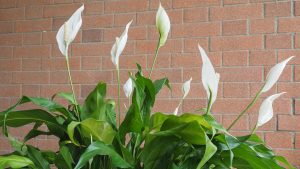Most of us consider our bedroom to be our sanctuary, an area where we are able to rest and relax while getting a decent night’s sleep. But we’ve no concept that the chemicals in our room, like formaldehyde from insulation and carpet backing, trichloroethylene from cleaning supplies, and benzene from solvents and paints, are all harmful to our health and might recirculate within the air we breathe while sleeping, affecting the standard of our sleep. So, how can we minimize this? By including some bedroom plants into your decor.
Health Benefits Of Having Plants In Your Bedroom
Some people believe that having plants in your bedroom isn’t an honest idea, however, the majority of individuals who have plants in their bedrooms disagree. Plants, like humans, respire within the same way we do, but within the opposite sequence and at a considerably slower rate. Plants take carbon dioxide from the atmosphere and generate oxygen, which they’ll then release at nighttime.
Improve Indoor Air Quality
Certain chemicals, like formaldehyde, benzene, trichloroethylene, xylene, and toluene, will be mistakenly redistributed into the air in our bedrooms, as previously discussed. Air purifying plants for bedrooms can have an influence on the air under the proper conditions since they absorb and trap a number of these poisons and release oxygen, leading to cleaner air for you to breathe. These air purifying plants for the bedroom may additionally help you sleep better.
They can help relieve stress
What more advantages may you gain from your bedroom’s indoor plants? As you wind down for the day, it appears that taking care of your plants can facilitate your feel less stressed and anxious. Even 2 minutes of touching the leaves of your plants can help reduce your stress levels and provides you positive vibes.
They help the area look lively
One of the thrills of getting indoor plants in your bedroom is that it can help to make the area more lively. Any living plant has the flexibility to brighten up space. A potted plant on your bedside table or in a very distant corner of your home can help to embellish your area.
5 best plants for bedroom
Snake Plant

Also called Mother-In-Law’s tongue, this insanely low-maintenance plant is an optimal choice for the bedroom because not only does it claim a spot on NASA’s list of the highest 10 air-purifying plants, but it is also one among few houseplants that convert greenhouse emission into oxygen at nighttime.
Bedroom Benefit: Filters indoor air during the day and night
Care Tip: Bright indirect light; water occasionally
Golden Pothos


Similar in aesthetic to the heartleaf philodendron, the trailing pothos plant is effective at filtering out formaldehyde, carbon monoxide gas, and benzene and is extremely easy to care for and grow. it’s been nicknamed ‘the cubicle plant’ thanks to how tolerant it is.
Bedroom Benefit: Purifies indoor air of poisons and helps eliminate odors
Care Tip: Moderate light; water regularly.
Rubber Plant


This low-maintenance beauty with its striking forest green leaves may be a powerful toxin eliminator and air purifier. The abundant leaves of this plant draw in large amounts of contaminants, making it excellent at cleaning indoor air. Allow these plants to dry between watering and keep them in moderate to low light.
Bedroom Benefit: Improve indoor air quality by absorbing airborne chemicals.
Care Tip: Moderate to low light; water occasionally.
Peace Lily


This is probably one in every of the foremost popular bedroom plants that you’ll find because it grows fairly well in high or low light areas. It’s known for having glossy leaves and might even handle all types of irrigation systems. It’s easy to identify whether your plant needs watering as its leaves and flowers can become droopy but should perk back up when water is reintroduced. you can place it near the windows to assist encourage blooming or, if your space doesn’t get enough sunlight, you’ll choose the domino variety of flowers because it can thrive well in low light.
Bedroom Benefit: Purifies indoor air and may absorb acetone vapors.
Care Tip: Moderate to bright indirect light; water regularly.
Philodendron


Philodendron may are originally popular back within the ’70s, but they’re going to always have an area even in modern homes, especially in bedrooms of house owners who need a no-fuss plant to grow. you’ll be able to pot them, hang them, or place them anywhere you wish. Just confirm that it does get a touch amount of sunshine because it might not have the best in no-light situations.
Bedroom Benefit: Absorbs formaldehyde from the air.
Care Tip: Moderate to bright light; water occasionally.
It’s time to take advantage of the health benefits of bedroom plants. All the above have a positive effect on your health. Whether you want a boost to your mental or your physical health, plants will definitely do it.
